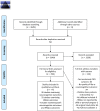Neurocognitive functioning and health-related quality of life of children after pediatric intensive care admission: a systematic review
- PMID: 35357629
- PMCID: PMC9356943
- DOI: 10.1007/s11136-022-03124-z
Neurocognitive functioning and health-related quality of life of children after pediatric intensive care admission: a systematic review
Erratum in
-
Correction to: Neurocognitive functioning and health‑related quality of life of children after pediatric intensive care admission: a systematic review.Qual Life Res. 2022 Sep;31(9):2615-2617. doi: 10.1007/s11136-022-03144-9. Qual Life Res. 2022. PMID: 35532836 Free PMC article. No abstract available.
Abstract
Objective: This study systematically reviewed recent findings on neurocognitive functioning and health-related quality of life (HRQoL) of children after pediatric intensive care unit admission (PICU).
Data sources: Electronic databases searched included Embase, Medline Ovid, Web of Science, Cochrane CENTRAL, and Google Scholar. The search was limited to studies published in the last five years (2015-2019).
Study selection: Original studies assessing neurocognitive functioning or HRQoL in children who were previously admitted to the PICU were included in this systematic review.
Data extraction: Of the 3649 identified studies, 299 met the inclusion criteria based on title abstract screening. After full-text screening, 75 articles were included in the qualitative data reviewing: 38 on neurocognitive functioning, 33 on HRQoL, and 4 on both outcomes.
Data synthesis: Studies examining neurocognitive functioning found overall worse scores for general intellectual functioning, attention, processing speed, memory, and executive functioning. Studies investigating HRQoL found overall worse scores for both physical and psychosocial HRQoL. On the short term (≤ 12 months), most studies reported HRQoL impairments, whereas in some long-term studies HRQoL normalized. The effectiveness of the few intervention studies during and after PICU admission on long-term outcomes varied.
Conclusions: PICU survivors have lower scores for neurocognitive functioning and HRQoL than children from the general population. A structured follow-up program after a PICU admission is needed to identify those children and parents who are at risk. However, more research is needed into testing interventions in randomized controlled trials aiming on preventing or improving impairments in critically ill children during and after PICU admission.
Keywords: Child health; Critical illness; Follow-up studies; Neuropsychology; Pediatric intensive care unit; Quality of life.
© 2022. The Author(s).
Conflict of interest statement
The funders of the study had no role in study design, data collection, data analysis, data interpretation, writing of the report, or the decision to submit for publication. The corresponding author had final responsibility for the decision to submit for publication.
Figures
References
-
- Pollack MM, Holubkov R, Funai T, Clark A, Berger JT, Meert K, Newth CJ, Shanley T, Moler F, Carcillo J, Berg RA, Dalton H, Wessel DL, Harrison RE, Doctor A, Dean JM, Jenkins TL. Pediatric intensive care outcomes: development of new morbidities during pediatric critical care. Pediatric Critical Care Medicine. 2014;15(9):821–827. doi: 10.1097/PCC.0000000000000250. - DOI - PMC - PubMed
-
- Benjafield JG. Cognition. 4. Oxford University Press; 2010.
Publication types
MeSH terms
LinkOut - more resources
Full Text Sources
Miscellaneous


